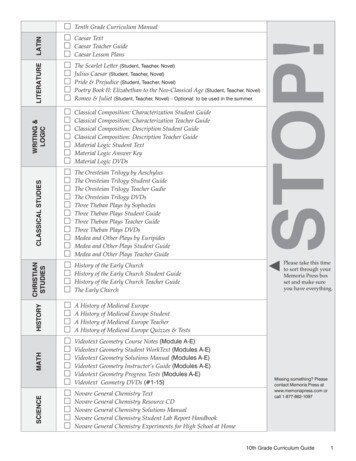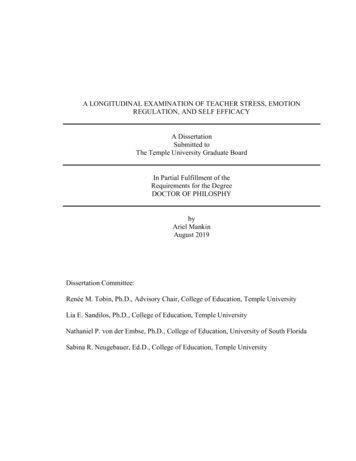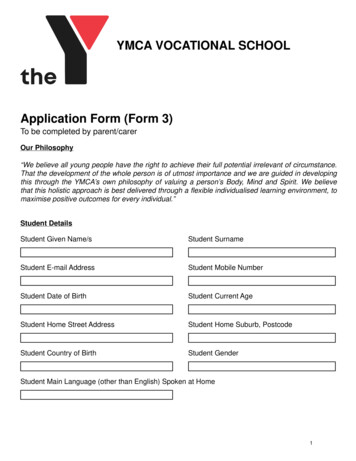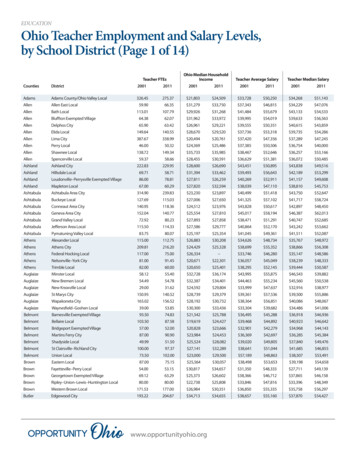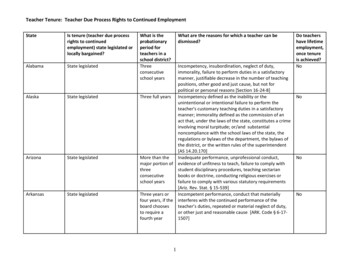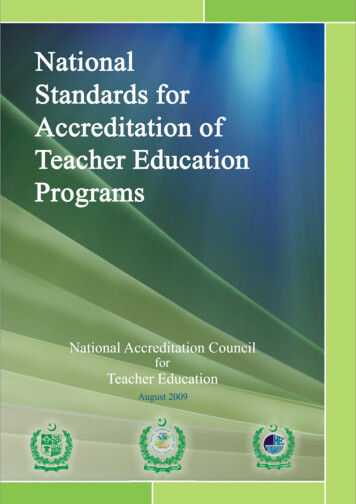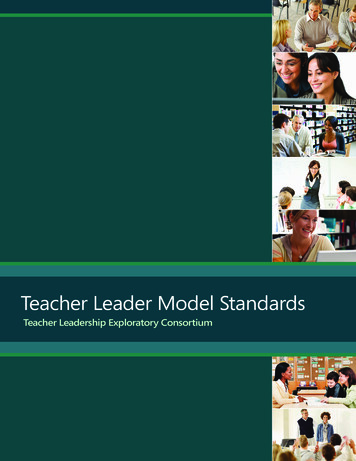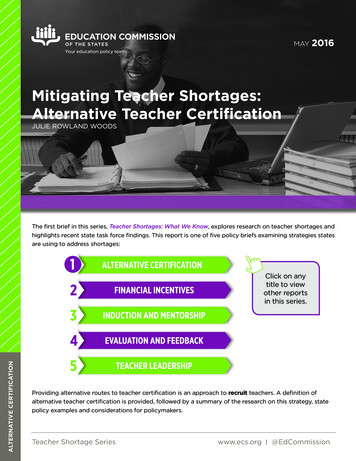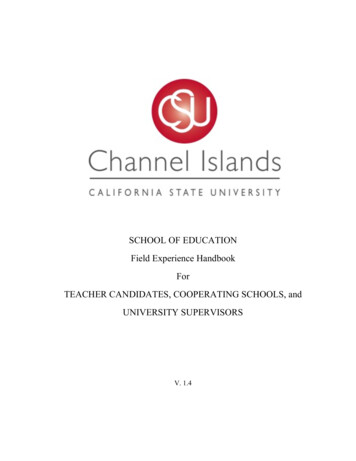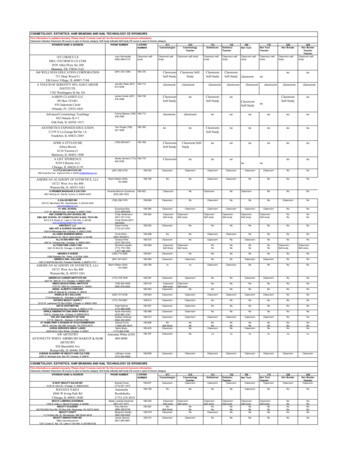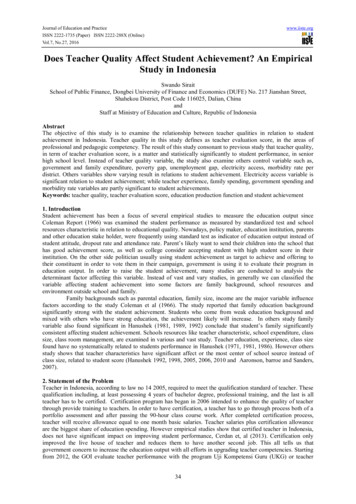
Transcription
Journal of Education and PracticeISSN 2222-1735 (Paper) ISSN 2222-288X (Online)Vol.7, No.27, 2016www.iiste.orgDoes Teacher Quality Affect Student Achievement? An EmpiricalStudy in IndonesiaSwando SiraitSchool of Public Finance, Dongbei University of Finance and Economics (DUFE) No. 217 Jianshan Street,Shahekou District, Post Code 116025, Dalian, ChinaandStaff at Ministry of Education and Culture, Republic of IndonesiaAbstractThe objective of this study is to examine the relationship between teacher qualities in relation to studentachievement in Indonesia. Teacher quality in this study defines as teacher evaluation score, in the areas ofprofessional and pedagogic competency. The result of this study consonant to previous study that teacher quality,in term of teacher evaluation score, is a matter and statistically significantly to student performance, in seniorhigh school level. Instead of teacher quality variable, the study also examine others control variable such as,government and family expenditure, poverty gap, unemployment gap, electricity access, morbidity rate perdistrict. Others variables show varying result in relations to student achievement. Electricity access variable issignificant relation to student achievement; while teacher experience, family spending, government spending andmorbidity rate variables are partly significant to student achievements.Keywords: teacher quality, teacher evaluation score, education production function and student achievement1. IntroductionStudent achievement has been a focus of several empirical studies to measure the education output sinceColeman Report (1966) was examined the student performance as measured by standardized test and schoolresources characteristic in relation to educational quality. Nowadays, policy maker, education institution, parentsand other education stake holder, were frequently using standard test as indicator of education output instead ofstudent attitude, dropout rate and attendance rate. Parent’s likely want to send their children into the school thathas good achievement score, as well as college consider accepting student with high student score in theirinstitution. On the other side politician usually using student achievement as target to achieve and offering totheir constituent in order to vote them in their campaign, government is using it to evaluate their program ineducation output. In order to raise the student achievement, many studies are conducted to analysis thedeterminant factor affecting this variable. Instead of vast and vary studies, in generally we can classified thevariable affecting student achievement into some factors are family background, school resources andenvironment outside school and family.Family backgrounds such as parental education, family size, income are the major variable influencefactors according to the study Coleman et al (1966). The study reported that family education backgroundsignificantly strong with the student achievement. Students who come from weak education background andmixed with others who have strong education, the achievement likely will increase. In others study familyvariable also found significant in Hanushek (1981, 1989, 1992) conclude that student’s family significantlyconsistent affecting student achievement. Schools resources like teacher characteristic, school expenditure, classsize, class room management, are examined in various and vast study. Teacher education, experience, class sizefound have no systematically related to students performance in Hanushek (1971, 1981, 1986). However othersstudy shows that teacher characteristics have significant affect or the most center of school source instead ofclass size, related to student score (Hanushek 1992, 1998, 2005, 2006, 2010 and Aaronson, barroe and Sanders,2007).2. Statement of the ProblemTeacher in Indonesia, according to law no 14 2005, required to meet the qualification standard of teacher. Thesequalification including, at least possessing 4 years of bachelor degree, professional training, and the last is allteacher has to be certified. Certification program has began in 2006 intended to enhance the quality of teacherthrough provide training to teachers. In order to have certification, a teacher has to go through process both of aportfolio assessment and after passing the 90-hour class course work. After completed certification process,teacher will receive allowance equal to one month basic salaries. Teacher salaries plus certification allowanceare the biggest share of education spending. However empirical studies show that certified teacher in Indonesia,does not have significant impact on improving student performance, Cerdan et, al (2013). Certification onlyimproved the live house of teacher and reduces them to have another second job. This all tells us thatgovernment concern to increase the education output with all efforts in upgrading teacher competencies. Startingfrom 2012, the GOI evaluate teacher performance with the program Uji Kompetensi Guru (UKG) or teacher34
Journal of Education and PracticeISSN 2222-1735 (Paper) ISSN 2222-288X (Online)Vol.7, No.27, 2016www.iiste.orgcompetencies test. The objective of this program is to identify teacher baseline competencies and then highlightsthe result as basis for teacher continuous professional development and improvement. The Evaluation coveredtwo areas of teacher competencies, pedagogic and professional subject matter. In pedagogic area, teacherevaluate how they integrate pedagogic concept implemented in class room learning process, while professionalsubject evaluate teacher how they mastering and understand each of the subject in their field.3. Literature ReviewMany Studies show that teacher quality is the key central in student performance. The most questions arising onteacher characteristic is what kind of teacher attribute improving student quality. This question explored byDarling-Hammond (2000), Milanowski (2004), Rockof (2004), and Dobbie 2011. Rivkin Hanushek and kain(2005), and Kane, Rockoff, Staiger (2008). All of this study has the same findings that teacher characteristicsignificantly affect the student performance. Teacher characteristic such as, education background, experience,certificate status, leadership experience, perseverance, teacher evaluation score, preparedness course work arethe variables that much pay attention by the scholar in relation to student achievement.However the method to assessing teacher quality in delivering teaching in classroom is still debatingamong the researcher. Teacher score test according to some studies, believed can predicted the quality of eachteacher in delivering student achievement. Milanowski (2004) found that proper teacher evaluation test can beused as tools to predict student achievement. Goldhaber (2007) used teacher license test to predict teachereffectiveness in the link to effect student achievement. The evidence of this study is supporting the hypothesisthat teacher licensure test correlated to student achievement. Teacher quality in term of certification licensefound the most powerful tolls to predicting student achievement than the others variable such teacher degree,salaries, and expenditure level (Darling-Hammond 2000). White (2004) and Hill et al (2005) are using teacherevaluation score to predict student gain, and their result support that teacher evaluation score significantly relatedto student gain. Longitudinal database of The Tennessee Value-Added Assessment System (TVAAS) used bySander Rivers (2000) to evaluate teacher and affect on student performance, they found that effective teacheraffecting gain of student score. Although many studies supporting teacher quality affecting student gain, severalscholar opposed the idea. Budding, R., & Zamarro, G. (2009) found that teacher characteristic such as teacherlicensure testing uncorrelated to student success in the classroom. Similar studies also argue that teachercharacteristic in term of teacher score and certified teacher unrelated to student scores see Huang, F. L., & Moon,T. R. (2009); Hanushek, et al (2005); McColskey et al. (2005), Sawchuk, S. (2011). Related studies to teachercharacteristic in Indonesia, performed by Fahmi et al (2011) found that teacher certification unrelated to studentachievement.Socio economic status (SES) as it is confirmed in Konstantopoulos, S. (2005); Dahl (2005); Wobmann,(2006); Lacour (2011); Reardon (2011); Willingham (2012); and Silvernail et al (2014) found the correlation ofSES to student achievement. Student comes from wealthy family tend to have better performance than unwealthy students. Low achievement related to poor resources in physical, spiritual, in making student gettingsuccess in their study. School location demographic is also found matter to student learning Jianzhong Xu (2009)and Mersch, R. L. D. (2012). Both of this study concluded that there is variation of student performance indifference places.4. Purpose of the StudyThis study motivated by the previous empirical study, that student achievement become focus on huge studiesstarting from Colemen Report (1966). In the huge vast and varied study, teacher characteristic found as the mostimportant variable affecting student achievement. Government of Indonesia (GOI) starting 2006 administersteacher certification aiming to improve teacher quality. GOI also evaluate teacher quality by doing teachercompetency testing (UKG) began in 2012 to assessing teacher competency in the field subject of teaching andpedagogic knowledge. Most of the government expenditure in education is used to funding teacher salaries andallowance of certification. This study intended to examine and explore the variable affecting studentachievement in two areas are examine the relationship between teacher evaluations score and studentachievement; and examine other variable controls such as parent expenditure, government expenditure,availability of electricity, morbidity rate in relation to student achievement.5. Data and MethodologyThis study deploys junior and senior secondary school data per district across Indonesia. Appendix 1 and 2stipulate the data description in this study. Student performance derived from senior high school and junior highschool of national exam on average period 2010-2013, per district. This national exam administer by ministry ofeducation and culture GOI. The exam score range from 0 to 100, for all subject mathematic, English, chemistryand biology. Teacher evaluation score is sourcing from UKG on average per district. UKG intended to measureteacher competencies in each of their field subject, in the area of pedagogy and professional expertise. The score35
Journal of Education and PracticeISSN 2222-1735 (Paper) ISSN 2222-288X (Online)Vol.7, No.27, 2016www.iiste.orgof the evaluation range from 0 to 100. Others control variable used in the study are enrolment, teacherexperience, and education back ground is obtained from ministry of education. Data of per capita expenditure ineducation, unemployment, morbidity rate, electricity access, poverty gap sourcing from data set in fromindodapoer world bank, and the last data, government expenditure in education derived from ministry of finance.Education production function concept widely used in measuring education output. This concept wasused in coleman report (1966), Hanushek 1986, 1995, lee and barro (1997), sawada (2000). On general thesestudy found that student achievement affecting by student family background, school resources, and communityor district community factors. Based on previous studies, we use model of education production function toestimate student achievement as follows:Where:Ait Student Achievement, X1 Teacher Evaluation score, X2 Teacher experience, X3 Teacher educationbackground, X4 Student enrolment, X5 Family spending on education, X6 District Government spending oneducation, X7 Electricity access, X8 Unemployment Gap, X9 Morbidity RateX10 Poverty Gap.6. ResultTable.1 describing the regression result for senior high school level. The estimation result showing that teacherevaluation score statistically significant in relation to student achievement in all subject of Mathematic,Chemistry, Biology and English language. Experience of teacher variables are mixed on each of subject, it issignificant on Biology and English subject. Family spending on education significant related on Chemistry andEnglish subject, while government spending significant only in mathematic. Electricity variable is significantlyrelated to all subjects of test score. Definition of electricity here is how the student can accesses the lamp forstudying, watching television, browsing the internet, using computer and other electronic devices.Unemployment and poverty variable do not have significant correlation to student achievement in all subject,while morbidity rate mixed, significant on mathematic and chemistry and insignificant on biology and chemistry.Table. 1. Student Test Score Regression Results (Senior High School Level)MathChemistryBiologyEnglishTeacher )*(0.037)*(0.041)*Teacher )**(0.149)**Education 0.038)(0.030)**Family (0.163)*Government (0.035)Electricity *(0.036)*Unemployment )Morbidity )(0.036)Poverty 8)Observation429417422438R-Square0.310.280.240.33* significant at 1%; ** significant at 5%Source: Author Calculation36
Journal of Education and PracticeISSN 2222-1735 (Paper) ISSN 2222-288X (Online)Vol.7, No.27, 2016www.iiste.orgTable.2 describing the regression result on Junior high school level. Teacher evaluation score, at juniorhigh school level, not enough proved that teacher evaluation score has close relationship with studentachievement. Others teacher characteristics such as teacher experience, education background also showing nocorrelation with student achievement. The strong relationship only showed by enrolment and morbidity rate. Thecoefficient of determination (R2) at junior high school has low value, 0.07, compare to senior high school. Thisregression model telling us only small parts of relationship between teacher characteristic and others variable inaffecting student achievement. Regression model in senior high school is better explaining the relationship.Table.2. Student Test Score Regression Results (Junior High School Level)MathEnglish-0.155-0.040Teacher Evaluation score(0.092)(0.067)Teacher Experience0.1980.021(0.182)(0.077)Education (0.069) *(0.052) **Family expenditure0.0490.277(0.309)(0.235)Government Expenditure-0.068-0.066(0.066)(0.050)Electricity access0.012-0.036(0.069)(0.051)Unemployment gap-0.4740.004(0.485)(0.360)Morbidity rate-0.180-0.162(0.069) **(0.052) *Poverty are0.070.07* significant at 1%; ** significant at 5%Source: Author CalculationThis study found that, the senior high school level, teacher quality statistically significant affectingstudent achievement, while it is insignificant in Junior high school level. There is gap of education level betweenjunior high school and senior high school teacher. In senior high school, Teachers with bachelor or 4 year degreeis more than junior high school. This is might the reason why teacher evaluation scores insignificant andunrelated to student achievement in junior high school level. Teacher quality is defined as teacher capabilities inthe area of in professional knowledge and pedagogical matters. This empirical study consonant with studies ofKimball, et al (2004); Hill et al (2005); Goldhaber (2006); Buddin, R., & Zamarro, G. (2008); ferguson andbrown (2008), noted that teacher evaluation score has a positive relationship with student achievement. Access toelectricity variable also statistically significant, as noted that every district specially in the east area, almost notcovered by electricity causing the students do not using electronic devices such as computer, TV, lamp etc. Thisphenomenon reveal in the study of Glewwe, P. et .al (2011) study conducted in developing countries thatelectricity found statistically significant and positive on students score. Teacher experience significant onBiology and English subject while mathematic and chemistry are insignificant. Unemployment and poverty gapfound no correlation to student achievement in this study, as it found close related in Lacour (2011), Dahl (2005),Reardon, (2011).7. Implication and ConclusionTeacher evaluation score, senior high school level, found statistically positive and significant in relation tostudent achievement. However teacher evaluation score is insignificant in junior high school level. This findingssupport the studies that teacher quality is matter to student achievement. Stake holder may use teacher evaluation37
Journal of Education and PracticeISSN 2222-1735 (Paper) ISSN 2222-288X (Online)Vol.7, No.27, 2016www.iiste.orgscore to evaluate teacher performance, and as basis for further improvement. Instead of teacher quality, districtgovernment also must pay attention to electricity access in their area since this variable significant related tostudent achievement. Availability of this electricity infrastructure will make the students easier and comfortableto study both in the schools or their house. This study also noted that district spending variable has small affecton student performance. Education spending share is mostly used for teacher cost. Study conducted by Cerdan etal.(2013) noted that education spending mainly used for teacher personal cost include teacher salaries andallowance of certification. Allocation budget on teacher training and development are still less pay attention bythe government. Class size effect or low Student teacher ratio, base on some studies have small effect oradvantage on student outcomes. Teacher distribution is unequal among district across Indonesia, Mae ChuChang et al (2014). The region with excessive teacher will have big spending and vice versa deficit teacher inremote and rural have less education budget. Policy should be addressing to enhance teacher capabilities andprofessional development rather than focus on smaller class size or increase teacher personal. Teacherdistribution needs to take action by central government, since the unequal teacher in some region. This policyshould be done by central government, since teacher recruitment done by local government without coordinationand communication with others local governments.Regard to data availability, this study using data per district to explore teacher qualities and studentachievement relationship. In the future, study should be extended by using data per class or at least per schoolbasis, so the result will be better rather than per district. Teacher variable may is using teacher qualities in termof teaching class method, UKG score per individual, teacher sex and race and the time period of data. Studentvariable should consider for social economic class background, parents education, and other entities, so we willknow if there is variation result of each entities included.References:Aaronson, D., Barrow, L., & Sander, W. (2007). Teachers and student achievement in the Chicago public highschools. Journal of labor Economics, 25(1), 95-135.Buddin, R., & Zamarro, G. (2008). Teacher quality, teacher licensure tests, and student achievement. SantaMonica, CA: RAND.Cerdan-Infantes, P., Makarova, Y., Al-Samarrai, S., & Chen, D. (2013). Spending more or spending better:improving education financing in Indonesia. Policy brief. Washington DC: rimproving-education-financing-indonesia).Chang, M. C., Shaeffer, S., Al-Samarrai, S., Ragatz, A. B., de Ree, J., & Stevenson, R. (2014). Teacher reform inIndonesia.Clotfelter, C. T., Ladd, H. F., & Jacob, L. (2007). Vigor." How and Why Do Teacher Credentials Matter forStudent Achievement?”. Working Paper, Cambridge, MA: National Bureau of Economic Research.Coleman, J. S. (1966). Equal schools or equal students?. The Public Interest, (4), 70.Dahl, G. B., & Lochner, L. (2005). The impact of family income on child achievement (No. w11279). NationalBureau of Economic Research.Darling-Hammond, L. (2000). Teacher quality and student achievement. Education policy analysis archives, 8, 1.De Ree, J., Muralidharan, K., Pradhan, M., & Rogers, F. H. (2014). Double for Nothing? The Effects ofUnconditional Teacher Salary Increases on Performance.Ferguson, R. F., & Brown, J. (2000). Certification test scores, teacher quality, and student achievement. Analyticissues in the assessment of student achievement, 133-156.Glewwe, P. W., Hanushek, E. A., Humpage, S. D., & Ravina, R. (2011). School resources and educationaloutcomes in developing countries: A review of the literature from 1990 to 2010 (No. w17554).National Bureau of Economic Research.Goldhaber, D. (2007). Everyone’s doing it, but what does teacher testing tell us about teacher effectiveness?.Journal of human Resources, 42(4), 765-794.Hill, H. C., Rowan, B., & Ball, D. L. (2005). Effects of teachers’ mathematical knowledge for teaching onstudent achievement. American educational research journal, 42(2), 371-406.Lacour, M., & Tissington, L. D. (2011). The effects of poverty on academic achievement. Educational Researchand Reviews, 6(7), 522-527Kane, T. J., Rockoff, J. E., & Staiger, D. O. (2008). What does certification tell us about teacher effectiveness?Evidence from New York City. Economics of Education review, 27(6), 615-631.Kimball, S. M., White, B., Milanowski, A. T., & Borman, G. (2004). Examining the relationship betweenteacher evaluation and student assessment results in Washoe County. Peabody Journal of Education,79(4), 54-78.Konstantopoulos, S. (2005). Trends of school effects on student achievement: Evidence from NLS: 72, HSB: 82,38
Journal of Education and PracticeISSN 2222-1735 (Paper) ISSN 2222-288X (Online)Vol.7, No.27, 2016www.iiste.organd NELS: 92.Milanowski, A. (2004). The relationship between teacher performance evaluation scores and studentachievement: Evidence from Cincinnati. Peabody Journal of Education, 79(4), 33-53.Mersch, R. L. D. (2012). Student Academic Achievement in Rural Vs. Non-rural High Schools in Wisconsin(Doctoral dissertation, Edgewood College, Madison).OECD/Asian Development Bank (2015), Education in Indonesia: Rising to the Challenge, OECDPublishing, Paris.Rivers, J. C., & Sanders, W. L. (2002). Teacher quality and equity in educational opportunity: Findings andpolicy implications. Teacher quality, 13-23.Rivkin, S. G., Hanushek, E. A., & Kain, J. F. (2005). Teachers, schools, and academic achievement.Econometrica, 73(2), 417-458.Reardon, S. F. (2011). The widening academic achievement gap between the rich and the poor: New evidenceand possible explanations. Whither opportunity, 91-116.Rockoff, J. E. (2004). The impact of individual teachers on student achievement: Evidence from panel data. TheAmerican Economic Review, 94(2), 247-252.White, B. (2004). The relationship between teacher evaluation scores and student achievement: Evidence fromCoventry, RI. TC, 4, 04.39
Journal of Education and PracticeISSN 2222-1735 (Paper) ISSN 2222-288X (Online)Vol.7, No.27, 2016www.iiste.orgAppendix 1. Data Profile (Senior High School Level)NoVariablesSymbolsMeanStd. 829303132333435363738394041424344Student Achievement (English score test)EnrollmentTeacher experienceTeacher evaluation scoreFamily expenditureUnemployementMorbidity accessGoverment expenditureElectricity accessPoverty gapTeacher educationStudent Achievement (Biology score test)EnrollmentTeacher experienceTeacher evaluation scoreFamily expenditureUnemployementMorbidity accessGoverment expenditureElectricity accessPoverty gapTeacher educationStudent Achievement (Chemistry score test)EnrollmentTeacher experienceTeacher evaluation scoreFamily expenditureUnemployementMorbidity accessGoverment expenditureElectricity accessPoverty gapTeacher educationStudent Achievement (Math score test)enrolmentteacher experienceTeacher evaluation scoreFamily expenditureUnemployementMorbidity accessGoverment expenditureElectricity accessPoverty gapTeacher 9429429429429429429429
Journal of Education and PracticeISSN 2222-1735 (Paper) ISSN 2222-288X (Online)Vol.7, No.27, 2016www.iiste.orgAppendix 2. Data Profile (Junior High School esStudent Achivement (English score test)EnrollmentTeacher experienceTeacher evaluation scoreFamily expenditureUnemployementMorbidity accessGoverment expenditureElectricity accessPoverty gapTeacher educationStudent Achivement (Math Score Test)EnrollmentTeacher experienceTeacher evaluation scoreFamily expenditureUnemployementMorbidity accesGoverment expenditureElectricity accessPoverty gapTeacher 35,2393,431,860,19Std. 43443443443443443443443
to student gain. Longitudinal database of The Tennessee Value-Added Assessment System (TVAAS) used by Sander Rivers (2000) to evaluate teacher and affect on student performance, they found that effective teacher affecting gain of student score. Although many studies supporting teacher quality affecting student gain, several scholar opposed the .
